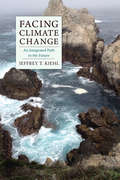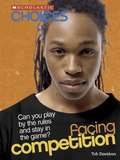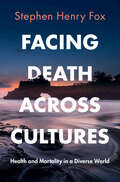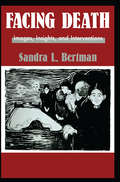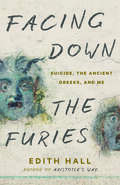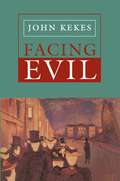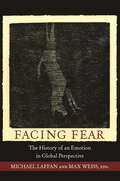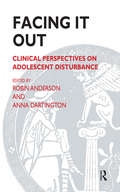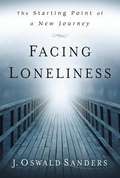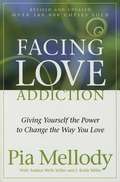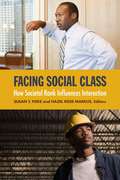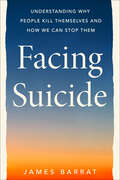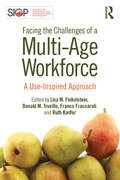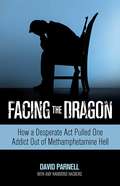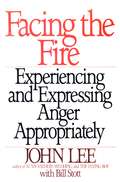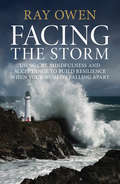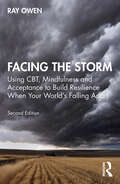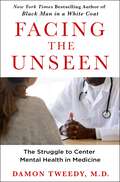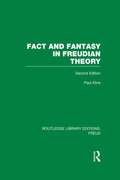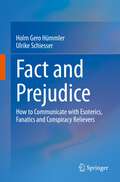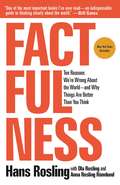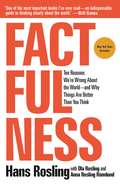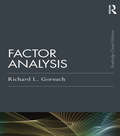- Table View
- List View
Facing Climate Change: An Integrated Path to the Future
by Jeffrey KiehlFacing Climate Change explains why people refuse to accept evidence of a warming planet and shows how to move past partisanship to reach a consensus for action. A climate scientist and licensed Jungian analyst, Jeffrey T. Kiehl examines the psychological phenomena that twist our relationship to the natural world and their role in shaping the cultural beliefs that distance us further from nature. He also accounts for the emotions triggered by the lived experience of climate change and the feelings of fear and loss they inspire, which lead us to deny the reality of our warming planet.But it is not too late. By evaluating our way of being, Kiehl unleashes a potential human emotional understanding that can reform our behavior and help protect the Earth. Kiehl dives deep into the human brain's psychological structures and human spirituality's imaginative power, mining promising resources for creating a healthier connection to the environment—and one another. Facing Climate Change is as concerned with repairing our social and political fractures as it is with reestablishing our ties to the world, teaching us to push past partisanship and unite around the shared attributes that are key to our survival. Kiehl encourages policy makers and activists to appeal to our interdependence as a global society, extracting politics from the process and making decisions about our climate future that are substantial and sustaining.
Facing Climate Change: An Integrated Path to the Future
by Jeffrey T. KiehlJeffrey T. Kiehl is a senior scientist at the National Center for Atmospheric Research and a fellow of the American Geophysical Union and the American Meteorological Society. He is a recipient of the AGU Climate Communication Prize. He is also a senior Jungian analyst with the C. G. Jung Institute of Colorado, the Inter-Regional Society of Jungian Analysts, and the International Association for Analytical Psychology.
Facing Competition: Can You Play by the Rules and Stay in the Game?
by Tish DavidsonChildren's book on competing, its good and bad aspects.
Facing Death Across Cultures: Health and Mortality in a Diverse World
by Stephen Henry FoxThis book is an invaluable resource for understanding the profound connections between culture, healthcare, and mortality. In a world where healthcare professionals ꟷ doctors, nurses, clients, patients, and staff ꟷ are increasingly engaging in cross-cultural interactions, this text equips readers with essential insights to navigate diverse beliefs and expectations surrounding health and treatment, particularly in moments of stress and vulnerability. While healthcare is often grounded in Euro-American belief systems, this book broadens the reader's perspective, offering essential tools to enhance intercultural understanding during health crises and end-of-life care. It empowers both patients and practitioners to adapt and collaborate, fostering better treatment outcomes by bridging cultural divides. Gaining this multicultural lens is not only crucial for healthcare and cross-cultural psychology but also for confronting the universal experience of mortality ꟷ our own and that of our loved ones.
Facing Death: A Handbook For Educators, Healthcare Professionals, And Counselors (Series in Death, Dying, and Bereavement)
by Sandra L. BertmanFacing Death is a unique handbook for educators, healthcare professionals and counselors. It uses materials from the visual arts, excerpts from poetry, fiction, drama, and examples from popular culture to sensitize the reader to important, universal issues confronting the dying, and those responsible for their care.
Facing Down the Furies: Suicide, the Ancient Greeks, and Me
by Edith HallAn award-winning classicist turns to Greek tragedies for the wisdom to understand the damage caused by suicide and help those who are contemplating suicide themselves In Sophocles&’ tragedy Oedipus the Tyrant, a messenger arrives to report that Jocasta, queen of Thebes, has killed herself. To prepare listeners for this terrible news, he announces, &“The tragedies that hurt the most are those that sufferers have chosen for themselves.&” Edith Hall, whose own life and psyche have been shaped by such loss—her mother&’s grandfather, mother, and first cousin all took their own lives—traces the philosophical arguments on suicide, from Plato and Aristotle to David Hume and Albert Camus. In this deeply personal story, Hall explores the psychological damage that suicide inflicts across generations, relating it to the ancient Greek idea of a family curse. She draws parallels between characters from Greek tragedy and her own relatives, including her great-grandfather, whose life and death bore similar motivations to Sophocles&’ Ajax: both men were overwhelmed by shame and humiliation. Hall, haunted by her own periodic suicidal urges, shows how plays by Sophocles and other Greek dramatists helped her work through the loss of her grandmother and namesake Edith and understand her relationship with her own mother. The wisdom and solace found in the ancient tragedies, she argues, can help one choose survival over painful adversity and offer comfort to those who are tragically bereaved.
Facing Evil
by John KekesJohn Kekes demonstrates that the prevalence of evil presents a fundamental problem for our secular sensibility and develops the theory of character-morality as a response. He believes that the main sources of evil are produced by our character defects and through unchosen ations and that we can increase our control over the evil we cause.
Facing Fear: The History of an Emotion in Global Perspective (Publications in Partnership with the Shelby Cullom Davis Center at Princeton University #4)
by Michael Laffan Max WeissFear is ubiquitous but slippery. It has been defined as a purely biological reality, derided as an excuse for cowardice, attacked as a force for social control, and even denigrated as an unnatural condition that has no place in the disenchanted world of enlightened modernity. In these times of institutionalized insecurity and global terror, Facing Fear sheds light on the meaning, diversity, and dynamism of fear in multiple world-historical contexts, and demonstrates how fear universally binds us to particular presents but also to a broad spectrum of memories, stories, and states in the past. From the eighteenth-century Peruvian highlands and the California borderlands to the urban cityscapes of contemporary Russia and India, this book collectively explores the wide range of causes, experiences, and explanations of this protean emotion. The volume contributes to the thriving literature on the history of emotions and destabilizes narratives that have often understood fear in very specific linguistic, cultural, and geographical settings. Rather, by using a comparative, multidisciplinary framework, the book situates fear in more global terms, breaks new ground in the historical and cultural analysis of emotions, and sets out a new agenda for further research. In addition to the editors, the contributors are Alexander Etkind, Lisbeth Haas, Andreas Killen, David Lederer, Melani McAlister, Ronald Schechter, Marla Stone, Ravi Sundaram, and Charles Walker.
Facing It Out: Clinical Perspectives on Adolescent Disturbance (Tavistock Clinic Series)
by Robin Anderson Anna DartingtonBased on the wealth of experience gathered in the forty years of the life of the Adolescent Department at the Clinic, this covers a full range of clinical work with some of the most difficult areas of adolescence, but it also gives a conceptual framework of normal adolescence and traces the difficulties that arise when this goes wrong. Facing It Out presents new work which has not previously been fully described. The book will be vital reading for clinicians whose work includes work with adolescents. The Adolescent Department of the Tavistock Clinic in its long history has been engaging with young people and their families when the strains prove too great. In this book, staff of the Adolescent Dept examine in accessible language different clinical aspects of adolescent disturbance, exploring in particular the impact on the family. The chapters look at a range of severity of disturbance from adjustment crises to anorexia nervosa and psychosis as well as aspects of adolescent development in small families and in the formation of a sense of identity. With the exception of infancy, adolescence is the most radical of all developmental periods.
Facing Loneliness The Starting Point of a New Journey
by J. Oswald SandersFacing Loneliness is an attempt to provide answers to the problem of loneliness and challenges you to take specific steps to overcome its unpleasant effects. Sanders shows how to identify the symptoms and causes of loneliness, and how to deal with the underlying issue - the lack of intimacy. Specific references to old and new testament scriptures are made, though in general the advice is useful for those of any background.
Facing Love Addiction: The Love Connection to Codependence, 1st Edition
by Pia Mellody J. Keith Miller Andrea Wells MillerIn this revised and updated version of Facing Love Addiction, Pia Mellody unravels the intricate dynamics of unhealthy love relationships and shows us how to let go of toxic love. Through twelve-step work, exercises, and journal-keeping, the book outlines the recovery process for Love Addicts, and Mellody’s fresh perspective and clear methods work to comfort and motivate all those looking to establish and maintain healthy, happy relationships.
Facing Social Class: How Societal Rank Influences Interaction
by Hazel Rose Markus Susan T. FiskeMany Americans, holding fast to the American Dream and the promise of equal opportunity, claim that social class doesn't matter. Yet the ways we talk and dress, our interactions with authority figures, the degree of trust we place in strangers, our religious beliefs, our achievements, our senses of morality and of ourselves--all are marked by social class, a powerful factor affecting every domain of life. In Facing Social Class, social psychologists Susan Fiske and Hazel Rose Markus, and a team of sociologists, anthropologists, linguists, and legal scholars, examine the many ways we communicate our class position to others and how social class shapes our daily, face-to-face interactions--from casual exchanges to interactions at school, work, and home. Facing Social Class exposes the contradiction between the American ideal of equal opportunity and the harsh reality of growing inequality, and it shows how this tension is reflected in cultural ideas and values, institutional practices, everyday social interactions, and psychological tendencies. Contributor Joan Williams examines cultural differences between middle- and working-class people and shows how the cultural gap between social class groups can influence everything from voting practices and political beliefs to work habits, home life, and social behaviors. In a similar vein, Annette Lareau and Jessica McCrory Calarco analyze the cultural advantages or disadvantages exhibited by different classes in institutional settings, such as those between parents and teachers. They find that middle-class parents are better able to advocate effectively for their children in school than are working-class parents, who are less likely to challenge a teacher's authority. Michael Kraus, Michelle Rheinschmidt, and Paul Piff explore the subtle ways we signal class status in social situations. Conversational style and how close one person stands to another, for example, can influence the balance of power in a business interaction. Diana Sanchez and Julie Garcia even demonstrate that markers of low socioeconomic status such as incarceration or unemployment can influence whether individuals are categorized as white or black--a finding that underscores how race and class may work in tandem to shape advantage or disadvantage in social interactions. The United States has one of the highest levels of income inequality and one of the lowest levels of social mobility among industrialized nations, yet many Americans continue to buy into the myth that theirs is a classless society. Facing Social Class faces the reality of how social class operates in our daily lives, why it is so pervasive, and what can be done to alleviate its effects.
Facing Suicide: Understanding Why People Kill Themselves and How We Can Stop Them
by James BarratA deep dive into a national catastrophe that examines how and why suicide happens so that we can prevent itSuicide has reached epidemic proportions in America, claiming over 45,000 lives each year—more than car accidents or homicides. For every person who dies there are about 10 unsuccessful attempts. Yet suicides are preventable, if we can grasp the complex factors behind it and look out for suicide&’s signs in our families, communities, and colleagues. In this groundbreaking book, acclaimed journalist James Barrat delivers these insights with a deep dive into America&’s suicide crisis.With profiles of survivors and their families, and interviews with experts, Barrat assembles a thorough, nuanced portrait of this confounding killer. He examines suicide&’s many risk factors, including genetics, substance abuse, access to lethal means, and mental health. Importantly, he explores how societal issues like racial trauma, bullying, and financial stress – in combination with other factors - can push people to kill themselves. Barrat reveals the structural and chemical differences found in suicidal brains, providing biological insights.Facing Suicide celebrates solutions. Barrat shows how the US Air Force and the nation of Denmark lowered suicide rates with comprehensive &‘systems approaches&’ that enlist every member of society in impactful interventions. Importantly, Barrat finds that 100% of the people he interviewed who attempted suicide are happy they got help and are alive today. Their message is one of healing and hope. With deep reporting and keen insights, Facing Suicide sheds essential light on this painful, growing crises with actionable information about preventing suicides. Barrat's urgent book makes clear that understanding and preventing suicide must be a national priority. We all have a role to play in this vital effort.
Facing the Challenges of a Multi-Age Workforce: A Use-Inspired Approach (SIOP Organizational Frontiers Series)
by Lisa M. Finkelstein Franco Fraccaroli Donald M. Truxillo Ruth KanferFacing the Challenges of a Multi-Age Workforce examines the shifting economic, cultural, and technological trends in the modern workplace that are taking place as a result of the aging global workforce. Taking an international perspective, contributors address workforce aging issues around the world, allowing for productive cross-cultural comparisons. Chapters adopt a use-inspired approach, with contributors proposing solutions to real problems faced by organizations, including global teamwork, unemployed youth, job obsolescence and over-qualification, heavy emotional labor and physically demanding jobs, and cross-age perceptions and communication. Additional commentaries from sociologists, gerontologists, economists, and scholars of labor and government round out the volume and demonstrate the interdisciplinary nature of this important topic.
Facing the Dragon: How a Desperate Act Pulled One Addict Out of Methamphetamine Hell
by David Parnell Amy HagbergAfter more than twenty-three years addicted to methamphetamine and other drugs, David Parnell put an SKS assault rifle under his chin and pulled the trigger. The blast took off half his face, yet somehow he survived. They called Parnell the "miracle man" at the Nashville hospital where he'd been pronounced clinically dead. Following an afterlife experience where he briefly experienced hell, David woke up in the hospital, and he was changed forever, both physically and emotionally.In Facing the Dragon, readers will witness the slow, agonizing metamorphosis of a good-looking high school athlete into a violent, drug-dealing, psychotic wife beater whose children were terrified of him. In graphic detail, they will relive his suicide attempts and then walk alongside him as he endures countless surgeries to reconstruct his decimated face and learns how to cope with his hideous disfigurement. Now thirty-nine, Parnell is clean and sober and is making the most of the second chance he's been given, bringing his message about the dangers of meth and other drugs to schools, prisons, churches, and antidrug organizations around the world as a full-time lecturer.By experiencing the nightmare of his life-—and his brief glimpse of hell--readers will find hope and healing when facing their own life-threatening dragons.
Facing the Fire: Experiencing and Expressing Anger Appropriately
by John Lee William StottThe author of The Flying Boy describes how repressing anger can have profound effects on personal health and guides readers step by step through the process of getting past their fears. From the Trade Paperback edition.
Facing the Nazi Past: United Germany and the Legacy of the Third Reich
by Bill NivenFacing the Nazi Past examines how the communist East viewed the events of these years very differently from West Germany during the Cold War. It explores the developments and debates that were symptomatic of this shift towards a more open confrontation with the past.
Facing the Storm: Using CBT, Mindfulness and Acceptance to Build Resilience When Your World's Falling Apart
by Ray OwenHighly Commended in the 2012 BMA Book Awards We live in a world where bad things can, and do, happen irrespective of whether we are good or bad, whether we consider ourselves lucky or doomed, and with no regard to fairness. Any of us can find ourselves facing redundancy, the breakdown of a relationship, bankruptcy or any number of life changing crises, or supporting someone else who is. And sometimes, no matter how much we might try, there’s nothing we can do to prevent or reduce the problem. But that doesn't mean you have to be helpless; no matter how bad the situation you're about to deal with, there are things that you can do to become more resilient and that will help you face the storm that's coming towards you or yours. Using Cognitive Behaviour Therapy (CBT) techniques and the latest developments in mindfulness and acceptance-based approaches, this practical guide will take you through each stage of preparing for, enduring and recovering from a major life crisis helping you better understand what's going on, and providing new tools for dealing with the situation. When there's a storm coming towards you, and you can't escape it, then you have to prepare to face it. Here's how.
Facing the Storm: Using CBT, Mindfulness and Acceptance to Build Resilience When Your World's Falling Apart
by Ray OwenFacing the Storm is a self-care book which aims to assist readers in dealing with life-changing events and recovering in the face of adversity. Drawing on evidence-based techniques from CBT and mindfulness and acceptance approaches, and a lifetime of experience with people confronting their own death, this book will show readers ways to cope better in the face of life’s storms. It guides them to make sense of what is happening, to make better choices in the face of disaster, build their ability to recover from the impact of events, and prioritise the things that matter most to them. This updated edition reflects recent research and new techniques while also addressing the changing world we have been living in – especially the impact of the Covid19 pandemic. The book will be of interest to people struggling with the big challenges of life, and for the psychology, health and social care professionals who help them.
Facing the Unseen: The Struggle to Center Mental Health in Medicine
by Damon TweedyFrom the New York Times bestselling author of Black Man in a White Coat comes a powerful and urgent call to center psychiatry and mental health care into the mainstream of medicineAs much as we all might wish that mental health problems, with their elusive causes and unsettling behaviors, simply did not exist, millions of people suffer from them, sometimes to an extreme extent. Many others face addiction to alcohol and other drugs, as overdose and suicide deaths abound. Yet the vast majority of doctors receive minimal instruction in treating these conditions during their lengthy medical training. This mismatch ignores the clear overlap between physical and mental distress, and too-often puts psychiatrists on the outside looking in as the medical system continues to fail many patients. In Facing The Unseen, bestselling author, professor of psychiatry, and practicing physician Damon Tweedy guides us through his days working in outpatient clinics, emergency rooms, and hospitals as he meets people from all walks of life who are grappling with physical and psychological illnesses. In powerful, compassionate, and eloquent prose, Tweedy argues for a more comprehensive and integrated approach where people with mental illness have a health care system that places their full well-being front and center.
Fact and Fantasy in Freudian Theory (Routledge Library Editions: Freud)
by Paul KlineOriginally published in 1972, this second edition in 1981 was fully revised and updated to cover recent developments in the field at the time. Fact and Fantasy in Freudian Theory was written to answer many questions and criticisms surrounding psychoanalysis. How much, if any, of Freudian theory is verifiable according to the usual criteria of scientific enquiry? Much work had been carried out at the time to discover which parts of Freudian theory are verifiable and which insupportable by experiment. In this book Dr Kline surveys this vast body of work. He takes, one by one, the central postulates of Freudian psychology and discusses the experiments which have been performed to test them. He scrutinizes each test, examines its methodology and its findings and weighs up its value. For some of the theories, it will be seen, there is no evidence whatsoever; for others, on the other hand, there is impressive and sometimes incontrovertible experimental support – for example, for the theory of repression. This work will continue to be an invaluable, highly detailed reference work for those involved with Freud’s work, and a book of great interest to those concerned with the method of psychological enquiry in general.
Fact and Prejudice: How to Communicate with Esoterics, Fanatics and Conspiracy Believers
by Holm Gero Hümmler Ulrike SchiesserWhen having coffee with your family, you are offered energized water. On Twitter you discuss with vaccination opponents. The WhatsApp kitagroup discusses zodiac signs, the pharmacy sells you globules, the neighbor proselytizes for her guru, and the news is once again about demonstrations by right-wing extremists.Everywhere you encounter conspiracy myths, superstition, esotericism, pseudoscience and Co. and you want to respond to them - while remaining as factual as possible, clarify your position, provide facts, but also not unnecessarily provoke or overload. In addition, you do not want to hurt your counterpart, but to encourage him to rethink. But how do you do that?If you are asking yourself this question, read "Fact and Prejudice". Understand why we are driven by emotions and most information bounces off us. Read experiences and tips from interviews with professional (science) communicators. Then follow different people through their own rethinking processes: What convinces an alternative medicine practitioner to leave non-evidence-based medicine behind? What was the deciding factor for a former vaccination opponent to have her children vaccinated after all? What helps members of appropriative organizations to get out? What moves a celebrated medium to break away from esotericism?This book is for anyone who worries about or doesn't know how to communicate with people who have irrational worldviews - whether it's with family, friends, anonymously on the Internet, or at work. The authors give concrete tips on discussions and situations and also help to decide when it is important to engage and when it is better to withdraw.
Factfulness: Ten Reasons We're Wrong About The World--and Why Things Are Better Than You Think
by Hans Rosling Anna Rosling Rönnlund Ola Rosling<P>Factfulness: The stress-reducing habit of only carrying opinions for which you have strong supporting facts. <P>When asked simple questions about global trends—what percentage of the world’s population live in poverty; why the world’s population is increasing; how many girls finish school—we systematically get the answers wrong. So wrong that a chimpanzee choosing answers at random will consistently outguess teachers, journalists, Nobel laureates, and investment bankers. <P>In Factfulness, Professor of International Health and global TED phenomenon Hans Rosling, together with his two long-time collaborators, Anna and Ola, offers a radical new explanation of why this happens. They reveal the ten instincts that distort our perspective—from our tendency to divide the world into two camps (usually some version of us and them) to the way we consume media (where fear rules) to how we perceive progress (believing that most things are getting worse).
Factfulness: Ten Reasons We're Wrong About the World--and Why Things Are Better Than You Think
by Hans Rosling Anna Rosling Rönnlund Ola RoslingINSTANT NEW YORK TIMES BESTSELLER“One of the most important books I’ve ever read—an indispensable guide to thinking clearly about the world.” – Bill Gates“Hans Rosling tells the story of ‘the secret silent miracle of human progress’ as only he can. But Factfulness does much more than that. It also explains why progress is so often secret and silent and teaches readers how to see it clearly.” —Melinda GatesFactfulness: The stress-reducing habit of only carrying opinions for which you have strong supporting facts. When asked simple questions about global trends—what percentage of the world’s population live in poverty; why the world’s population is increasing; how many girls finish school—we systematically get the answers wrong. So wrong that a chimpanzee choosing answers at random will consistently outguess teachers, journalists, Nobel laureates, and investment bankers.In Factfulness, Professor of International Health and global TED phenomenon Hans Rosling, together with his two long-time collaborators, Anna and Ola, offers a radical new explanation of why this happens. They reveal the ten instincts that distort our perspective—from our tendency to divide the world into two camps (usually some version of us and them) to the way we consume media (where fear rules) to how we perceive progress (believing that most things are getting worse). Our problem is that we don’t know what we don’t know, and even our guesses are informed by unconscious and predictable biases.It turns out that the world, for all its imperfections, is in a much better state than we might think. That doesn’t mean there aren’t real concerns. But when we worry about everything all the time instead of embracing a worldview based on facts, we can lose our ability to focus on the things that threaten us most. Inspiring and revelatory, filled with lively anecdotes and moving stories, Factfulness is an urgent and essential book that will change the way you see the world and empower you to respond to the crises and opportunities of the future. ---“This book is my last battle in my life-long mission to fight devastating ignorance…Previously I armed myself with huge data sets, eye-opening software, an energetic learning style and a Swedish bayonet for sword-swallowing. It wasn’t enough. But I hope this book will be.” Hans Rosling, February 2017.
Factor Analysis: Classic Edition (Psychology Press & Routledge Classic Editions)
by Richard L. GorsuchComprehensive and comprehensible, this classic text covers the basic and advanced topics essential for using factor analysis as a scientific tool in psychology, education, sociology, and related areas. Emphasizing the usefulness of the techniques, it presents sufficient mathematical background for understanding and applying its use. This includes the theory as well as the empirical evaluations. The overall goal is to show readers how to use factor analysis in their substantive research by highlighting when the differences in mathematical procedures have a major impact on the substantive conclusions, when the differences are not relevant, and when factor analysis might not be the best procedure to use. Although the original version was written years ago, the book maintains its relevance today by providing readers with a thorough understanding of the basic mathematical models so they can easily apply these models to their own research. Readers are presented with a very complete picture of the "inner workings" of these methods. The new Introduction highlights the remarkably few changes that the author would make if he were writing the book today. An ideal text for courses on factor analysis or as a supplement for multivariate analysis, structural equation modeling, or advanced quantitative techniques taught in psychology, education, and other social and behavioral sciences, researchers who use these techniques also appreciate this book’s thorough review of the basic models. Prerequisites include a graduate level course on statistics and a basic understanding of algebra. Sections with an asterisk can be skipped entirely if preferred.
